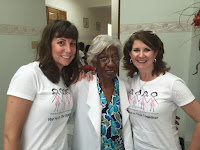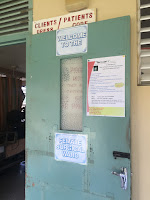Editor’s Note: Julie Kaehler was the third of nine RSM US LLP (RSM) employees given an opportunity “pursue their passions” as a result of the firm’s 90-90-9 program. Through 90-90-9, RSM is celebrating its 90th anniversary by providing nine employees with $90,000 ($10,000 each) and nine paid days off to fulfill their personal dreams. Read Julie's story:
While I’ve been to Haiti a number of times and have been working with
Vision Hope for Haiti (VHH) for a while, my recent 90-90-9 trip to Haiti through RSM’s 90-90-9 program was eye-opening. I now realize the issues and circumstances we often worry about here in the U.S. are minuscule, compared to those in Third World countries. The clean drinking water, regular meals, and ability to go the doctor if we’re ill or injured are things we tend to take for granted. But these aren’t readily available to many, including those in Haiti. Something very important to Third World citizens, including Haiti, though – just as it is to most of us here in the U.S. – is spending time with family and friends, and helping neighbors.
My “passion” through 90-90-9 was to use the $10,000 from RSM to purchase land to be used to build a school that will allow children to attend for free. (Public school isn’t free in Haiti and while most children would like to attend, many families can’t afford to send them.) Since it’s warm year-round in Haiti, schools can be built relatively inexpensively. Next steps will include building a structure and securing sponsorships to pay for children to attend.
Our long-term commitment with VHH is to empower Haitian people with the tools they need to make better lives for their children through education, nutrition and medical care. Haitians don’t necessarily want the lives we have here in the U.S. And we respect their lifestyle, and marvel at how happy they are with what we view as so little.
Before we even left for Haiti, we were blessed with generosity. Through the gracious efforts from Delta airlines and St. Luke’s Episcopal Church in Rochester, MN, we were able to get all our bags checked on the airline at no cost, allowing us to provide two wheelchairs, medical supplies, soccer balls, clothes, school supplies and more to Haitian children in need!
Upon our arrival, we were welcomed with open arms. Jonas and Dou Dou – the co-founders of ‘Vision Hope for Haiti,’ their volunteers and our Haitian “family” were at the airport to greet us. They loaded our bags, and we hopped in the back of the “tap tap” (a Haitian taxi, which is a small pickup with a welded canopy over the back and benches on both sides of the bed). I felt like I was home.
At the guest house, our hosts John David and Ann, along with their seven-year-old son Ralph, served us pumpkin soup, which is a special meal served usually reserved for Christmas and New Years in Haiti. It was delicious! (And this was just one of the many delicious meals we were served while there. Others included, Asian rice, beans, goat and beef bouillon.)
The next morning, Jonas and Dou Dou picked us up in the tap tap, after being stuck in traffic for an hour. (Five million people live in Port au Prince, and I’ve only seen one stop light in Haiti, which also explains why you rarely see a vehicle without dents.) Our first stop was the grocery store to pick up bottled water, bread, peanut butter, jelly and chips. This would be our lunch for the week. We then drove to the church where they have a community program for children. We filled out medical forms for the children, listened to them sing, and “showed them some love.” Our first full day in Haiti was good.
Throughout the remainder of the week, we returned to the church (which had been leveled by an earthquake in 2010, and is slowly being rebuilt) daily to spend time with the children – making crafts, and teaching English, computer and singing programs. We provided basic medical checks; distributed toothbrushes and toothpaste; served meals; and visited a local orphanage.
Louisiane, who manages the orphanage, doesn’t speak English but she was so grateful for everything we brought, including enough food to last the orphanage quite a while, and some much-needed clothing. My favorite part, however, was when we placed Moses and Cassandra in their wheelchairs. Moses showed his excitement by making noises and clapping; Cassandra sat quietly in her wheelchair with a BIG smile on her face. She looked like a princess. I often wonder if Cassandra and Moses would be able to walk and talk if they lived in the U.S., where they would have access to medical care, and physical and speech therapy.
One afternoon, after the children were fed, families came in for a presentation about beginning an agricultural family assistance program. We brought seeds and Chaya and Moringa twigs to plant. I explained the importance of the Chaya and Moringa, as these plants have many nutrients that help prevent malnutrition, which is so common in Haiti.
Another highlight of the trip included watching a local football club play soccer. Before last year, these children had not played in an organized league. In the summer of 2015, we took soccer balls, ball pumps and soccer shoes to the children. This time, we took more balls and supplies, as they told us that was what they needed. (The soccer fields in Haiti are not groomed like the fields in the U.S. The balls get a lot of wear and tear from all the use.) They have since formed the Santos Football Club, and boys at all age levels play. (To be able to play, they first have to attend practices and learn about being good citizens and the importance of education.)
The week passed so quickly. Before we left, however, we visited a memorial built on a site where more than 25,000 people were buried following the 2010 earthquake. Locals told us about how, after the earthquake, they would pile up the bodies at the end of their blocks, and dump trucks would pick them up to bring them to this site for a mass burial. The memorial isn’t completely finished but when you go inside, there is a feeling of sadness.
Each time I visit Haiti, it gets harder to leave. There is so much I would like to accomplish for our “family” there, so they can live without wondering when they will eat again, when they will have a job, when they will educate all of their children and when the orphans will have a safe place to live.
The people of Haiti have big dreams, and they work tirelessly every day with limited resources to improve their country. My goal is to continue to help by getting the tools they need in their hands so they can make the changes they would like to see in their country.
Read Julie's 90-90-9 submission.








































